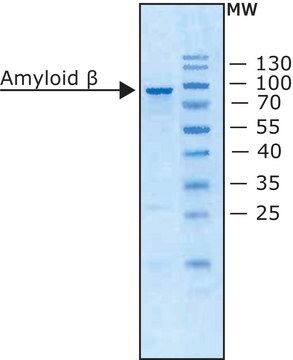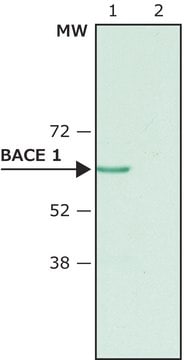171601
Amyloid Precursor Protein β-Secretase Inhibitor
The Amyloid Precursor Protein β-Secretase Inhibitor controls the biological activity of Amyloid Precursor Protein β-Secretase. This small molecule/inhibitor is primarily used for Neuroscience applications.
Synonym(s):
Amyloid Precursor Protein β-Secretase Inhibitor, KTEETSEVN(stat)VAEF
Sign Into View Organizational & Contract Pricing
All Photos(1)
About This Item
Empirical Formula (Hill Notation):
C73H118N16O27
Molecular Weight:
1651.81
UNSPSC Code:
12352202
NACRES:
NA.77
Recommended Products
Quality Level
Assay
≥98% (HPLC)
form
lyophilized
manufacturer/tradename
Calbiochem®
storage condition
OK to freeze
desiccated (hygroscopic)
solubility
aqueous buffer, pH 7.5: 1 mg/mL
shipped in
ambient
storage temp.
−20°C
General description
A potent inhibitor of the amyloid precursor protein (APP) β-secretase (IC50 = 30 nM).
Biochem/physiol Actions
Cell permeable: no
Primary Target
APP
APP
Product does not compete with ATP.
Reversible: no
Target IC50: 30 nM against amyloid precursor protein (APP) β-secretase
Warning
Toxicity: Standard Handling (A)
Sequence
H-Lys-Thr-Glu-Glu-Ile-Ser-Glu-Val-Asn-Stat-Val-Ala-Glu-Phe-OH [Stat = (3S,4S)-Statine]
Physical form
Supplied as a trifluoroacetate salt.
Reconstitution
Following reconstitution, aliquot and freeze (-20°C). Stock solutions are stable for up to 3 months at -20°C.
Other Notes
Sinha, S., et al. 1999. Nature 402, 537.
Legal Information
CALBIOCHEM is a registered trademark of Merck KGaA, Darmstadt, Germany
Storage Class Code
11 - Combustible Solids
WGK
WGK 1
Flash Point(F)
Not applicable
Flash Point(C)
Not applicable
Certificates of Analysis (COA)
Search for Certificates of Analysis (COA) by entering the products Lot/Batch Number. Lot and Batch Numbers can be found on a product’s label following the words ‘Lot’ or ‘Batch’.
Already Own This Product?
Find documentation for the products that you have recently purchased in the Document Library.
Zhi-Hao Wang et al.
Progress in neurobiology, 202, 102032-102032 (2021-03-16)
ApoE4, an apolipoprotein implicated in cholesterol transport and amyloid-β (Aβ) metabolism, is a major genetic risk determinant for Alzheimer's Disease (AD) and drives its pathogenesis via Aβ-dependent and -independent pathways. C/EBPβ, a proinflammatory cytokines-activated transcription factor, is upregulated in AD
Our team of scientists has experience in all areas of research including Life Science, Material Science, Chemical Synthesis, Chromatography, Analytical and many others.
Contact Technical Service








